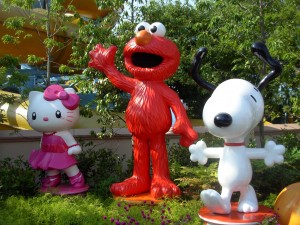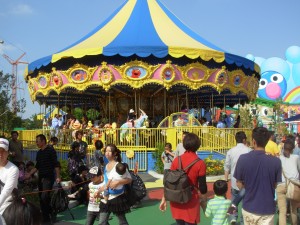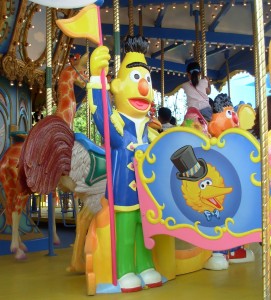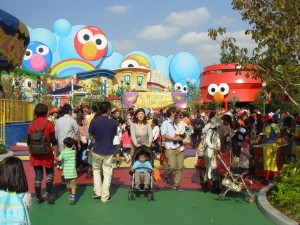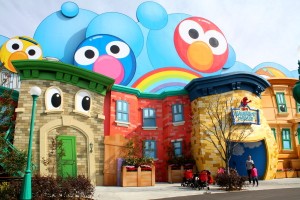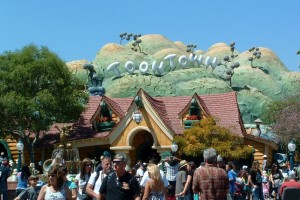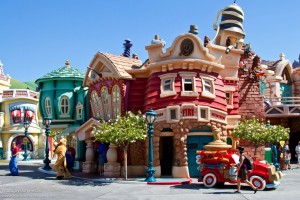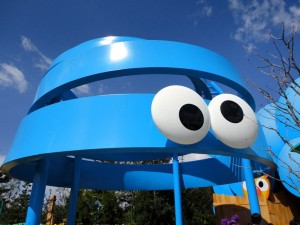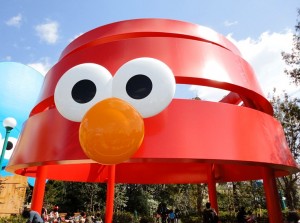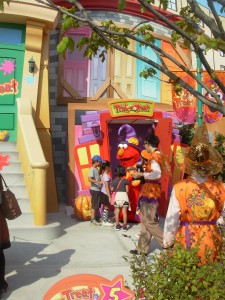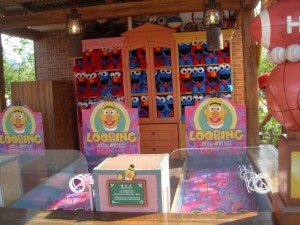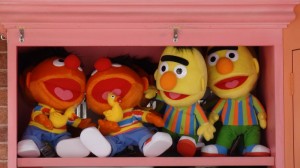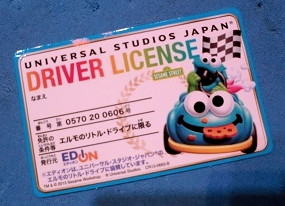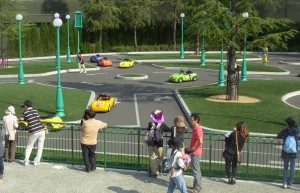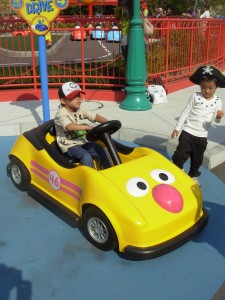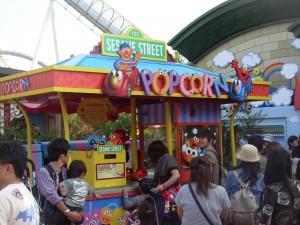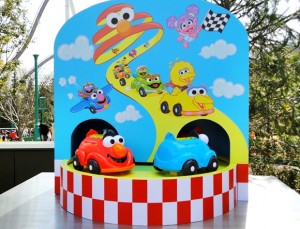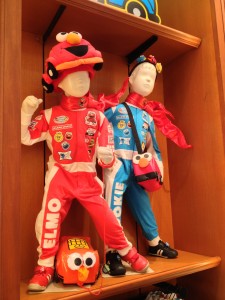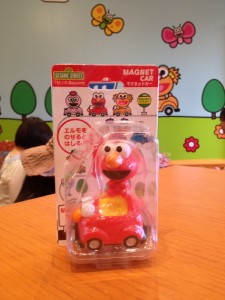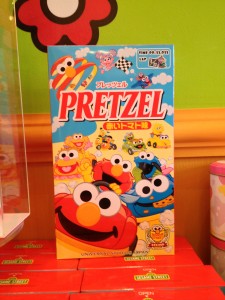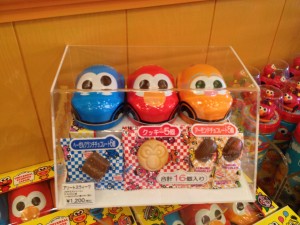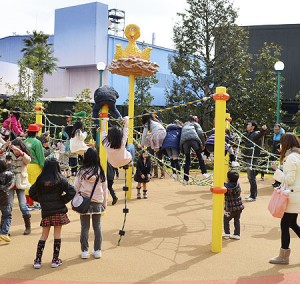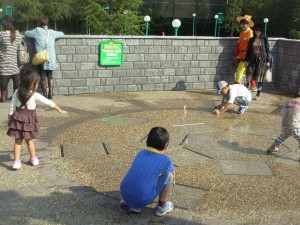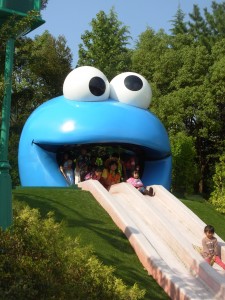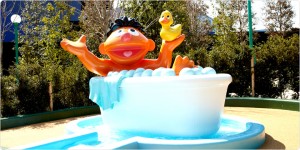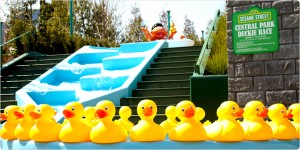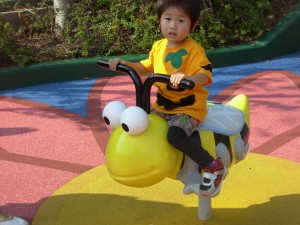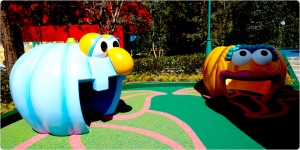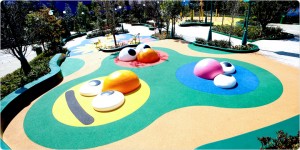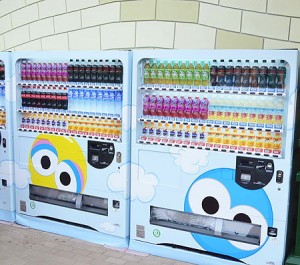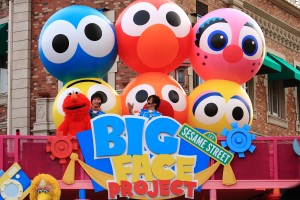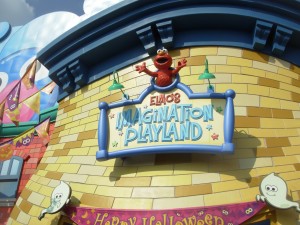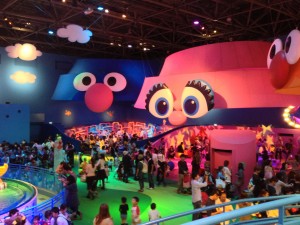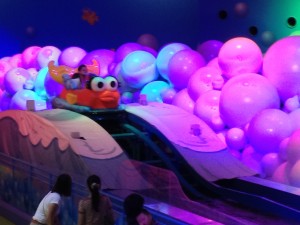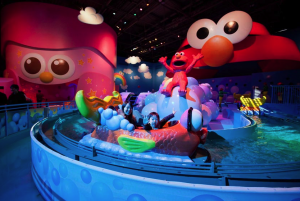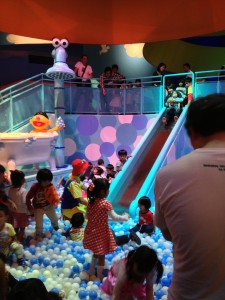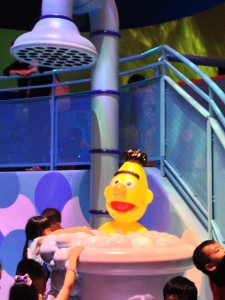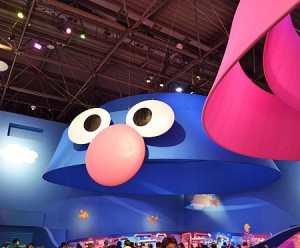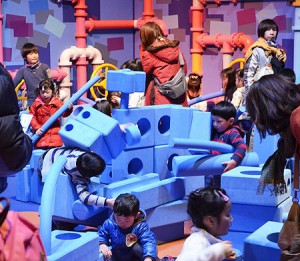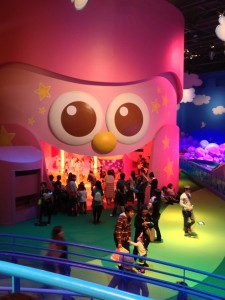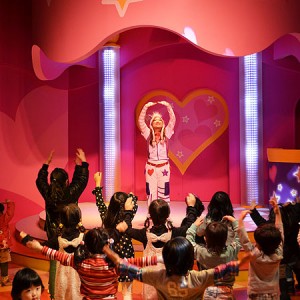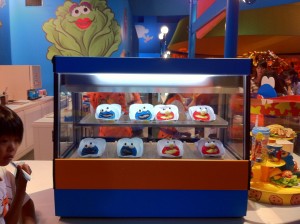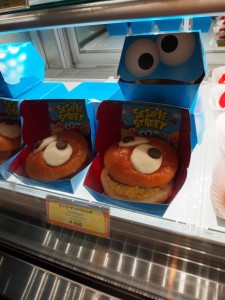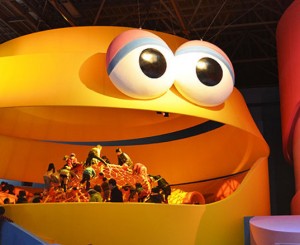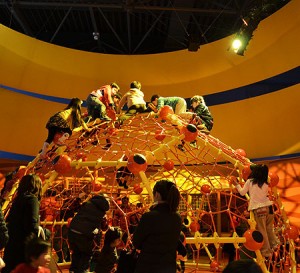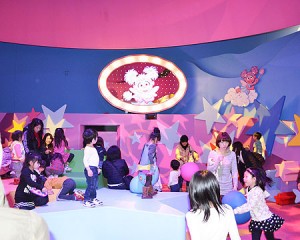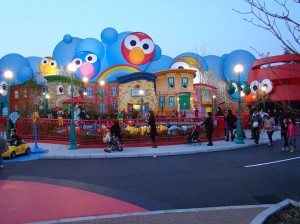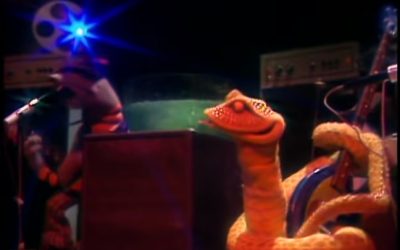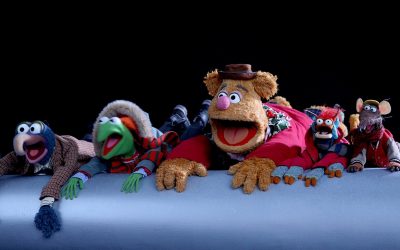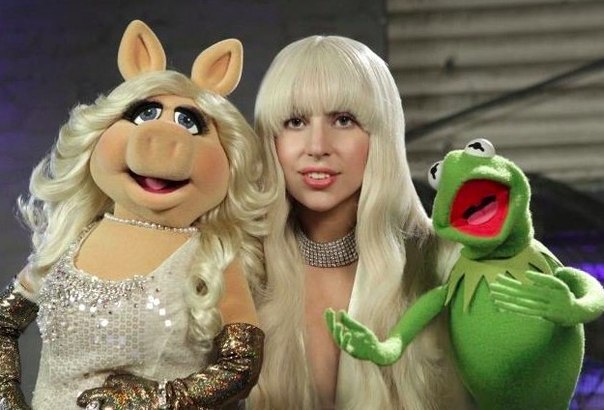Part 1: Welcome to Noisy Island
Part 2: Mostly About Popcorn
Part 3: 4-D Years of Life on the Street
Part 4: What is the Deal with Moppy?
Part 5: It’s a Fun World
Here’s something you should know about my husband, Ed: He loves Disney theme parks. We get annual passes to Disneyland every year, and we spent three days of our Japan trip checking out Tokyo Disneyland. We’re thinking about going to France sometime, just for the chance to see Disneyland Paris. So it’s not like I have to drag him by the hand to go spend time at a theme park.
I’m explaining this because we’re coming up to the moment when Universal Studios Japan broke my husband.
In March 2012, USJ opened a big new area called Universal Wonderland. It takes up 7 acres, and it can be seen from space. There are three zones in the new area — Sesame Street Fun World, Snoopy Studios and Hello Kitty Fashion Avenue. All of them are insane, and Sesame’s area is the biggest and most insane of them all.
Sesame Street Plaza
Sesame Street Fun World is divided into three parts, and the first one is called Sesame Street Plaza. As we approached the Sesame zone, the first thing we saw was a circus-themed carousel called Big Bird’s Big Top Circus. Pretty much your average carousel, but nicely decorated with pictures and figures of the Sesame characters.
Walking past the carousel, it started to get trippy. The Plaza is a fantasy landscape that’s based on Sesame Street, but run through a psychedelic Yellow Submarine filter. The buildings run together in waves. Some of the windows have eyes and smiles, as if the buildings are alive.
Now, that on its own is a seriously strange thing for USJ to do. They could do anything they liked with Snoopy’s hometown, because apart from the doghouse and the pitcher’s mound, there isn’t much of a landscape. But for the Sesame Street characters, there’s a very specific setting. The name of the street is the name of the show.
So Ed and I were looking around, saying, where the hell is this supposed to be? The buildings on Sesame Street don’t have faces. That’s not Sesame Street at all; that’s Toontown.
So once again, we found a little piece of Anaheim in Osaka Bay. Mickey’s Toontown is a Disneyland attraction that opened in 1993, a kids’ play area inspired by the setting of Who Framed Roger Rabbit. According to the Imagineering backstory, Toontown is the place where Mickey, Minnie, Donald and Goofy live — and when they opened Toontown to the public, they were just “opening the gates” to a place that had always been there.
In Mickey’s Toontown, all the buildings are curved and stretched; the Imagineers specifically decided that there shouldn’t be any right angles. That makes sense, because the town was built by animated characters, so it all holds together as a consistent story.
But you can’t really do that with Sesame Street. We already know where the Sesame characters live, and it’s not in a theme park. So USJ mixed Sesame Street with the Toontown aesthetic, and created a brand new piece of unreal estate.
But there were some USJ-specific elements as well. The Big Face Project was clearly still in effect here, with the characters’ faces painted on the skyline, and huge spiral gazebo structures towering over us.
Sesame Street Fun World actually presented us with kind of a postmodern experience, challenging us to make sense of the landscape. Obviously, you’re not supposed to interpret the Big Face spirals as representations of the characters. It’s also not a Toontown-style place that the characters built for us to play in. There’s no indication that the Sesame characters built these abstract monuments to themselves.
Where did this place come from, and what’s supposed to be real? Disney parks are always careful not to break the illusion, so you never see multiple versions of Mickey Mouse at the same time. But standing in Sesame Street Plaza, you can see Elmo painted on the backdrop, the Elmo Big Face spiral, Elmo’s figure on the carousel, and a walk-around Elmo that you can talk to. That’s a lot of different layers of reality, and you’re supposed to take it all in and make sense of it on your own. P.S. You’re five years old.
This is where Ed just gave up, finally overwhelmed by the visual stimulation. He took a break to sit on a bench, tap on his phone and pretend he was somewhere else. I could walk around and take pictures all I wanted, but Ed was no longer an active participant.
So I set off on my own, the last man standing. Here’s what else I found in the Plaza.
There was a “Trick or Treat” character greeting area, near the 123 Sesame brownstone-type thing. Kids lined up to knock on the door, and Elmo and Zoe would come out in Halloween costumes to distribute candy and pose for photos. This was the only place at USJ where I saw people line up to meet a character, so I assumed the candy was amazing.
Off to the side, there was a set of boardwalk-style game booths called “Bert and Ernie’s Prop Shop”, which I absolutely can not explain. Sesame Street Plaza featured several different overlapping motifs, including New York City, Toontown, Circus Big Top and Halloween Parade, and none of them could accommodate a game called “Looping Coaster”. If I thought about it too much, it made me feel like sitting on the bench with Ed, so I moved on.
Central Park
It was in the Central Park area where things really got serious. There were six attractions in this area, plus a popcorn cart and a store.
The centerpiece of the outdoor area was Grover’s Big Drive, a karting course where kids drove around in cars with Sesame faces on them. I didn’t get too close because it seemed like kind of a free for all. The USJ website says that the driving course “simulates the real Central Park in New York City,” but I didn’t really see the resemblance.
The Big Drive concept extended to a nearby popcorn stand, where they sold popcorn buckets shaped like the Sesame cars, and another gift shop. The merchandise was all themed to the Sesame cars, including kid-sized Sesame racing suits.
There were snacks based on the Big Drive, too. This is an area where USJ really had an advantage over the Disney parks — attraction-themed merchandise and snacks. The equivalent at Disneyland would be a gift shop next to the Haunted Mansion, selling tombstone-shaped cookies and ectoplasm-infused juice boxes. Now that I think of it, it’s kind of a shame that they don’t do that. Advantage: USJ.
Back outside, there was a set of outdoor playground activities, including a jungle-gym ropes course called Big Bird’s Climbing Nest…
A “water garden” called Central Park Springs, with jets of water shooting up from the pavement…
A huge slide running down Cookie Monster’s tongue…
A water play area called Central Park Duckie Race, where kids can send Rubber Duckies floating from Ernie’s bathtub down some steps to a little pool…
And then there’s Abby’s Magical Garden, which has ride-on Twiddlebugs, some huge pumpkins to crawl through, another jungle gym called Abby’s Magical Tree, and a completely mysterious open play area where you can climb around on Bert’s face.
And I have to confess: those last few pictures of the Duckie Race and Abby’s Magical Garden are borrowed from other people’s blogs. I didn’t take my own pictures of those areas, because I didn’t realize they were there.
I’m going to take a moment to underline that. I was walking all over the place, taking pictures of everything that I saw — and somehow I managed to completely miss the giant pumpkins and the magical tree. I must have walked right by them — I’ve looked at the area on Google Maps, and there’s no way that I could have walked between the popcorn cart, the Cookie Monster Slide and the Big Drive track without going right through the Magical Garden. I just didn’t see them.
Imagine being in an environment so super-saturated with Sesame imagery that you can walk past a huge circular three-dimensional Bert face and you don’t even notice it.
So I think that explains why Ed was sitting on a bench. And really, that was the only sane response to this place, because I realized that on a fundamental level, USJ is actively designed to overwhelm you.
Disney parks are all about telling coherent stories, using painstakingly detailed attractions and architecture. They even make graceful transitions from one area to the next, using color and texture to cross-fade from one place to another as you walk around.
USJ isn’t about story; it’s about sensation. The whole park was a giant mash-up of pop culture contradictions. Even the basic geography was baffling — we started out in Hollywood, and then traveled through New York City to get to San Francisco. But even more unsettling was the way they mixed pre-school franchises with violent horror and action movies, including Jaws and the Terminator. We walked out of Elmo’s Sweet Waffle shop, and right in front of us was an enormous dead shark, hanging from a crane.
So by the time we got to Sesame Street Fun World, the different competing realities had been stacking up so high that we just stopped trying to process the images around us into a coherent landscape.
And that’s when the “Big Face” thing suddenly made sense. I think the Big Face district is there to subconsciously prepare you, so that you’re able to walk around in Sesame Street Fun World without losing your mind.
That is the Project of the Big Face Project.
And, as unlikely as this might sound — there was still one more big Sesame attraction. On the far side of the Plaza, through the curved doors of the Toontown brownstones, there was a non-stop psychedelic warehouse rave party called Elmo’s Imagination Playland.
Elmo’s Imagination Playland
Elmo’s Imagination Playland was a huge indoor play space that was even busier, louder and more extravagant than anything we’d seen so far.
In theory, it was supposed to represent a happy dream world full of friends, fun and surprises. In reality, it was like a fluorescent airplane hangar that housed three competing bowling alleys. It was noisy and confusing, even for Japan.
The Playland had seven different areas, each marked with an enormous Big Face spiral representing a Sesame character.
At the center, there was a water ride called Elmo’s Bubble Bobble, where kids rode on a plastic Dorothy down a gentle waterfall, and around a little pool where a plastic Elmo played in the bubbles.
Continuing the water theme, sort of, there was an area called “Bert and Ernie’s Wonder — the Sea”, where kids went down a slide and into a ball pit that represented Ernie and Bert’s overflowing bathtubs. The sculpting on these character figures was really quite beautiful, even the Muppety shower heads.
Grover’s Construction Company had a room of giant plastic blocks to build with.
Moppy’s Lucky Dance Party was a guided preschool aerobics class, hosted by an enthusiastic twenty-something dressed in pink Moppy attire.
Cookie Monster Kitchen offered food that I didn’t really want to get too close to.
Big Bird’s Big Nest had another jungle gym.
And then there was Abby’s Magical Party, which was described as “a playland where small children can fully play, freely moving their body in the magical, mysterious space.” That basically meant a big space with not much in it.
After ten minutes in the Imagination Playland, I was ready to join Ed on the bench. I could see USJ starting to fold in on itself, doing a mash-up of its own mash-up. There were the Big Face spirals again, more Moppy dancing, Ernie in a bathtub, and another Big Bird jungle gym. This was a remix of a remix, and it fried my weak American brain.
And I realized that that’s the answer to my original question, about why Japanese merchandise is so creative and playful, and American merchandise is so bland. It’s because Japanese people are more interesting than we are.
Japanese children could enjoy Elmo’s Imagination Playland, because they’ve been trained from birth to live in a world where everything is everywhere. They’re raised to expect endless fractal complexity from their environment. As a result, they can handle more sensory input than we can.
You’d think that this would give them an infinitely small attention span, but it actually appears to make them more focused. They go deeper into the things that they love, finding more layers. Given the sheer mass of their character licensing production, it should be just as generic and dull as ours — but Japanese people have an unquenchable appetite for the new, and that demand is so strong that it cancels out the cost of constantly producing new designs.
Back at home, I’m still dreaming about Japan, where life was bigger and faster and louder. And now I’ve finally finished writing this epic My Week article — and if you’ve read this all the way to the end, then maybe there’s a little piece of Japan in all of us.
Click here to drive around in cars with Sesame faces on them on the Tough Pigs forum!
by Danny Horn

